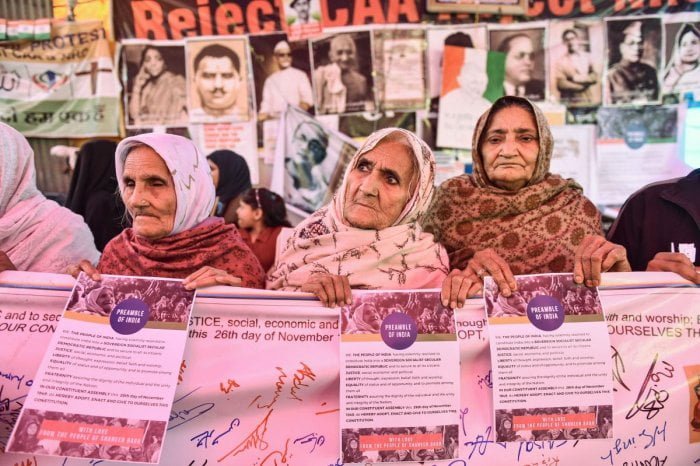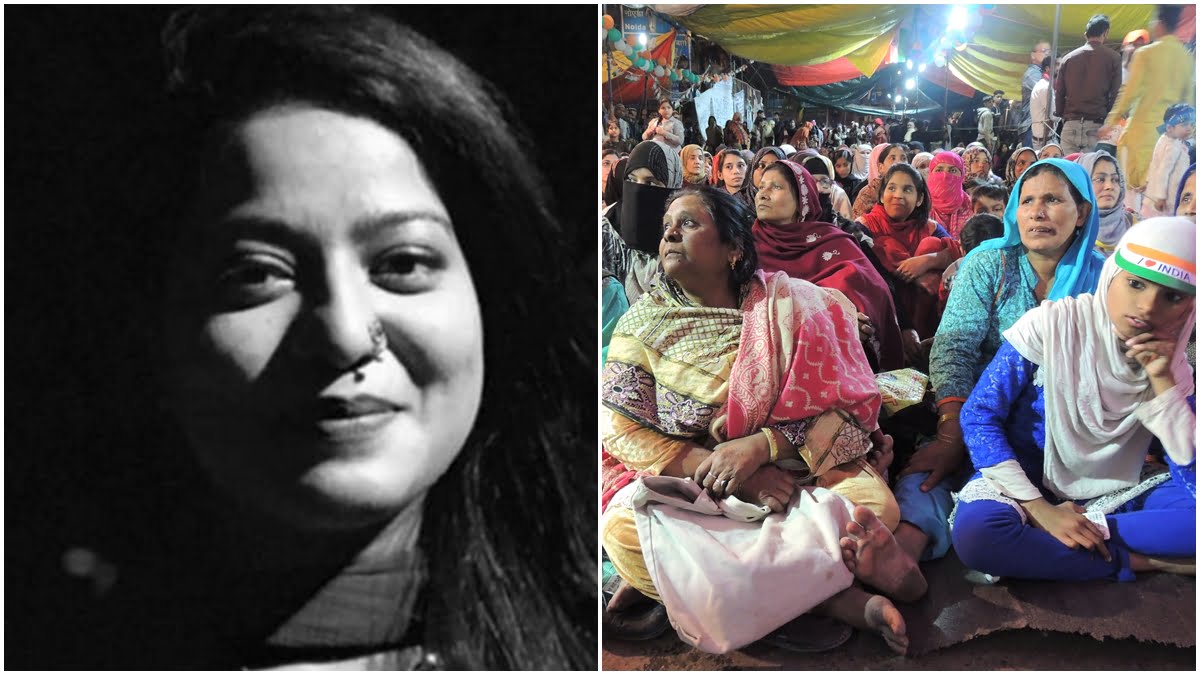The present authoritarian regime has continually ostracised and victimised the already marginalised religious community of Muslims. Since 2014, this radical otherisation of the Muslims has only become more visible and malicious – from the mob lynchings to now, the atrocious Citizenship Amendment Act (CAA) employed to exclude the community from their right to citizenship. Amidst these, the impunity with which the State employed draconian laws such as the UAPA and arrested Muslim women such as Gulfisha Fatima, Safoora Zargar and political activist Sadaf Jafar, among other women and student activists, only highlights the doubly-oppressed status of Muslim women in India.
The impunity with which the State arrested Muslim women such as Gulfisha Fatima, Safoora Zargar and political activist Sadaf Jafar, among other women and student activists, only highlights the doubly-oppressed state of Muslim women.
On 16 December 2019, a day after the brutal crackdown by the Delhi police on Jamia Millia Islamia students, the women of Shaheen Bagh decided to come on streets and fight for their rights as well as of their children against the unconstitutional CAA and NRC.
Shaheen Bagh will be remembered in the pages of history because, these Muslim women began a fight for their secular constitution against the ruthless regime and projected the road to courage and resilience. The women of Shaheen Bagh knew this rot runs deeper and it was time to stand up.
Gulafshan, a regular protestor of Shaheen Bagh says, “It was a constitutional fight for our rights. We still have a long way to go because even in a pandemic, Muslims are facing the brunt of communal hatred.” The panic-induced hysteria around vilifying the entire Muslim community after the Tablighi Jamaat congregation in March 2020, is an example of the same.
Also read: Islamophobia In The Times Of A Pandemic
Caught in the throngs of propagandist politics in the past few years, the position of Muslim women has only got compromised for the worse. The vicious trolling that Rana Ayyub faces on Twitter on a daily basis is an example. Her case shows how if you are a Muslim woman, some of the choicest abuses that trolls (both faceless or identifiable, especially right-wing extremists) will call you, are: Jihadi Jane, ISIS sex slave, porkistani, Islamo fascist, among others.
“I’ve even seen the hashtags, #RanaAyyubCD and #RanaAyyubRandi, trend for days.” Ayyub was quoted saying by a Hindustan Times report.
Delhi-based activist Shabnam Hashmi says “The protest of Shaheen Bagh allowed large number of Muslim women to interact with liberal and progressive circles. It was a welcoming scenario to see Muslim women coming out in response to the attack on the university students and not to save Islamic law. This is a secular fight for citizenship rights.”
The Shaheen Bagh sit-down protest was stalled for the safety of people keeping in mind the seriousness of the deadly outbreak of COVID-19 pandemic.
Affirming women’s vulnerability in the society even during a global pandemic, Lucknow based activist Sadaf Jafar said, “The present scenario of COVID-19 is really hitting hard on people because despite many precautionary measures, the government has been inefficient in providing adequate facilities to people.” Jafar said that Muslim women were always at the receiving end, whether it was in the form of character assassination of the Shaheen Bagh women or the loss of family and property in state violence.
Muslim women now live with a sense of fear for their future specifically because of the ruling regime’s continuous attacks on women amidst pandemic.
The Delhi Police reportedly submitted a report to the high court stating that 39 deliveries have taken place at the Tihar jail in the last ten years and hence, Safoora Zargar’s pregnancy should not be a ground for any preferential treatment against her alleged crime.
In the midst of a global health crisis, atrocities against Muslim women have only continued to risen. The Delhi Police reportedly submitted a report to the high court stating that 39 deliveries have taken place at the Tihar jail in the last ten years and hence, Safoora Zargar’s pregnancy should not be a ground for any preferential treatment against her alleged crime. However, she was finally granted bail on June 23 by the Delhi high court.
Nida Fatima, a PhD scholar of Jamia Millia Islamia believes that the pandemic has given the government an opportunity to use their state machinery in order to execute their plans. “Women have always been easy targets and are subjected to character assassination. There is no public outrage or resistance because people are struggling to deal with the pandemic.”

In the entire movement for citizenship rights, Muslim women faced a classic case of resistance leading to vulnerability. Muslim women were targeted and faced violence because they were protesting. Heba Ahmed, a research scholar of Jawaharlal Nehru University says, “Women came to claim their citizenship rights because if they are revoked, it affects the future of the community.”
Drawing references from the Rohingya community, she added, “Once the state declares a community as non-citizens, they can’t even claim protection from the state and this leads to a genocidal situation.”
Also read: Police Brutality Against Women: From Soni Sori To Safoora Zargar
However, this is not the first time that Muslim women had come out to resist. For example, the Babri Masjid Action Committee had a very active participation of Muslim women. Heba says, “I disagree with people who say that Shaheen Bagh is leading to a new resurgence of Muslim women because these women have a history of resisting against the injustice and we can’t deny that.” The Shaheen Bagh sit-down protest, is undeniably, however an important chapter of the Muslim women’s resistance against authoritarianism.
Meanwhile, these Muslim women have a firm belief that they will contribute in resistance against injustice and remember those thousands of people – young, old, from different faiths and communities – who mobilised on the streets with them to claim their spaces and identities. This is the India everyone is proud of.
Syeda Laraib Fatima is a Convergent Journalism student at AJKMCRC, Jamia Millia Islamia. She is an aspiring writer and isfascinated by people, facts and events. She hopes to change the world, one word at a time. She can be found on Instagram and Twitter.
Huda Mohammad is a Convergent Journalism student at AJKMCRC, Jamia Millia Islamia. She is a teacher and creative writer who believes that existing societal gaps of inequality can be eliminated through the spread of education and true penmanship. She can be found on Instagram and Twitter.




